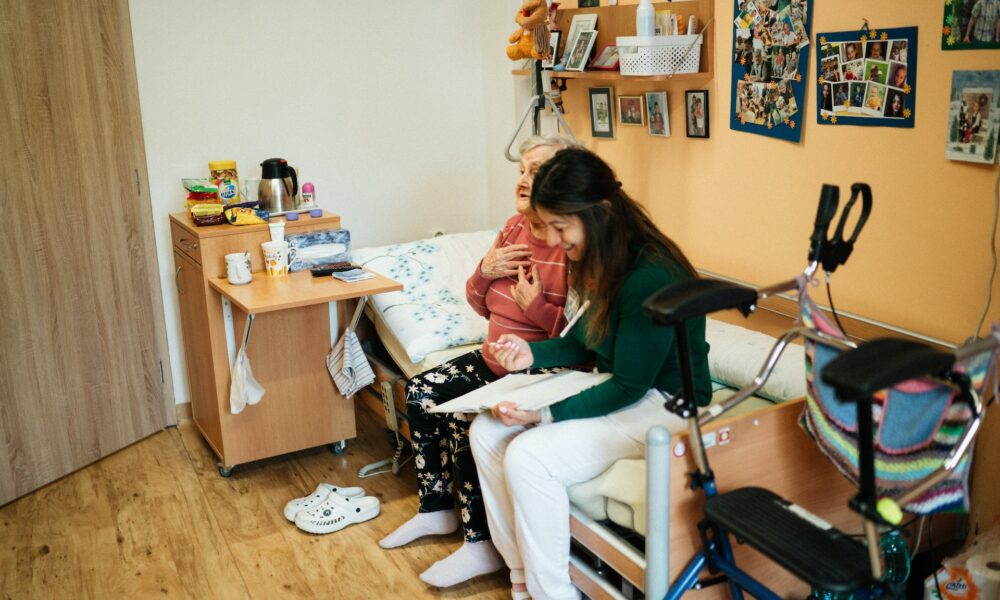Residents’ Rights Month is an event celebrated annually in October to honor all residents living in long-term care communities. The theme of the year 2023 – Amplify Our Voices – emphasizes a community of long-term care residents coming together to make their voices heard.
Nursing home residents have rights guaranteed by the 1987 Federal Nursing Home Reform Law. The law requires nursing homes to “promote and protect the rights of each resident” and stresses individual dignity and self-determination. Many states also include residents’ rights in state law or regulation. When moving into a long-term care community, the residents keep their rights – rather than losing them.
The complete list of residents’ rights are:
- Right to a Dignified Existence
- Right to Self-Determination
- Right to be Fully Informed of plan of care, room change, or roommate change before a change occurs, and the Ombudsman and state surveyors’ contact information.
- Right to Raise Grievances
- Right of Access to visitors, medical records, and participating in social, religious, and community activities…
- Rights Regarding Financial Affairs
- Right to Privacy
- Rights During Discharge/Transfer
Please read more about the Right of Access to Visitors through the personal comments of Michelle Gralnick, a Residents’ Rights Advocate and Private Care Manager, below.
One of the stated rights of a nursing home/skilled care facility resident is the Right of Access to Visitors. On the surface, being able to “have visitors at any time, as long as you wish to see them, as long as the visit does not interfere with the provision of care and privacy rights of other residents,” and “to see any person who gives you help with your health, social, legal, or other services,” seems very straight forward. I’d suggest that the role of visitors goes beyond the stated interaction and can serve as a safeguard for the resident to monitor the quality of care the facility provides, moving the need for visitors beyond a right to an imperative.
Residents can become accustomed to circumstances without realizing – or being able to articulate – that the delivery of care is not correct or complete. They may feel unsafe speaking up for fear of angering their care providers and worry about suffering the repercussions of neglect or mistreatment. They may not want to burden visitors with complaints to keep the conversation “positive” and to avoid the risk of causing a loved one guilt. Or they may already feel hopeless.
I encourage friends and families of residents to look at visits as being multi-purpose: to provide social and cognitive engagement to residents, to ease residents’ feelings of isolation and depression, and to confirm that everything the facility is contractually and legally obligated to provide is being done.
Are call buttons within reach? Is fresh water being provided each shift? Is a gait belt being used for transfers? Are team member’s name tags visible so residents know who is helping them? Is the resident left waiting more than 10 minutes after requesting assistance? Are staffers entering the room while talking on their phones? These “little” observations can make a big difference and are easily correctible. They also indicate the degree of care and attentiveness being extended each day. We can work together to amplify residents’ voices during Residents’ Rights Month – and every month.
My parents lived in skilled nursing facilities for nine years, and I began bringing my “proxy children” to visit them at the age of 5; over the years, it became second nature for these kids to observe and point out problem areas. When YOU visit, remember the lesson I taught them: “If you see something, say something,” and then be sure that something is done.
Michelle I. Gralnick, M.Ed., left her career in non-profit executive management in 2010 to coordinate her parents’ in-home and subsequent facility care, morphing into a local, state, and national health care advocate. She now uses these experiences as a Concierge Private Care Manager, providing customized services to individuals and their families.
Want to learn more about Nursing Home Residents’ Rights?
Read more in this past VOYCE blog, or view this VOYCE webinar on Residents’ Rights and What to Know About Leaving A Nursing Home BEFORE You Move In. Explore how the Ombudsman Program can help uphold residents’ rights and amplify residents’ voices.


my wife is in a nursing home. can they stop me from taking her home and caring for her.
This depends on several factors, including if your wife has a guardian or power of attorney that is not you. We suggest you reach out to the Ombudsman covering your wife’s facility who can help you and your wife make a decision that’s best for her.
Greetings,
My uncle is in a assisted/nursing home, I am his nephew. Question is how can I stop prevent other non family members from trying to remove him or take him out of the facility as they have tried before to gain financials? I have a POA but they still do not listen as I have warned them. I need advise Gary from Illinois.
thank you
Hi Gary,
We recommend you reach out to the ombudsman program in Illinois for Illinois specific advice. However, if your POA is active and your uncle is legally not able to make decisions for himself, the facility should not allow a transfer to another facility.
You can find the Illinois Ombudsman program at https://ilaging.illinois.gov/programs/ltcombudsman.html